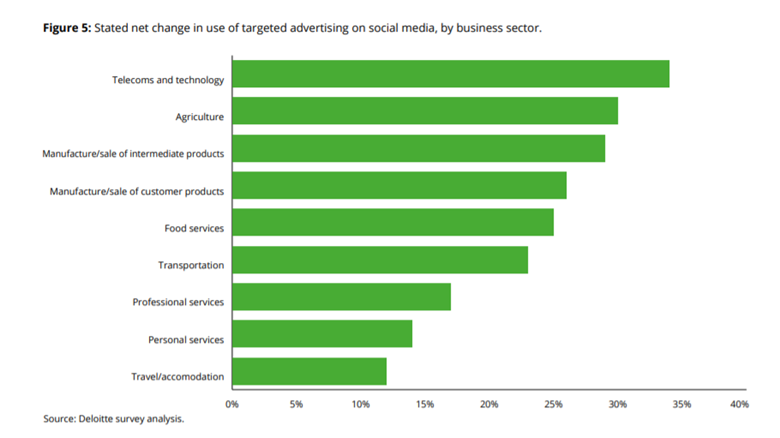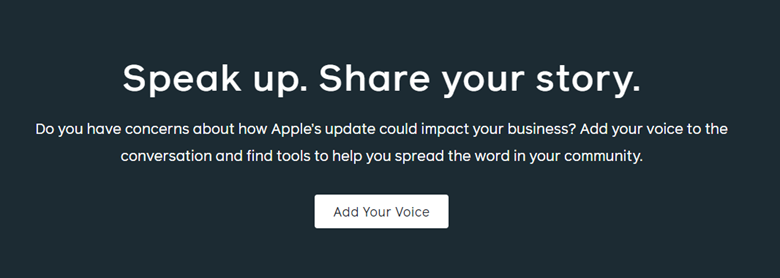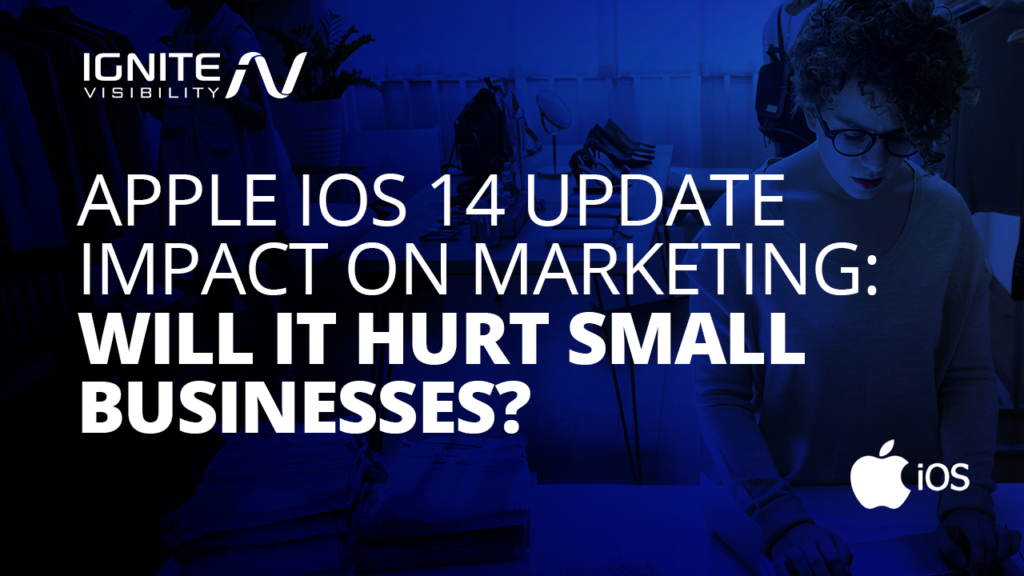Apple software updates aren’t uncommon, but the September 16, 2020 release of the Apple iOS 14 update brought with it some newsworthy changes. Many are wondering about the Apple iOS 14 update’s impact on marketing, and more specifically, its impacts on Facebook marketing.
Unfortunately, apps and businesses may be getting the short end of the stick—but that doesn’t mean SMBs are helpless when it comes to personalized ads.
Background on the Apple iOS 14 Update for Privacy
Apple first announced the iOS 14 update at their Worldwide Developers Conference (WWDC). This year, the conference took place virtually (like most events in 2020).
The update included two specific changes to the privacy policy:
- AppTrackingTransparency (ATT): This development is a framework requiring users to consent before apps and in-app advertisers can use their customer data.
- SKAdNetwork (SKA): This removes user-level data as well as more granular data, both of which advertisers of all kinds (including small businesses) depend on.
To dig into the update a bit more:
ATT will use an identifier for advertisers (IDFA) to notify mobile users on iPhones that they can select one of two options. The first option is sharing their phone activity and data with the app. The other is to opt out of sharing this information. It’s kind of like an “Accept Cookies” button, but for apps. These apps can be as big as Facebook or as small as a niche software app.
Even if a user opts out of sharing their information, apps will still be able to track some data. But a lot of granular-level tracking would be hindered.
Plus, mobile iPhone users will be prompted to scroll through an app’s privacy policy before making a decision on whether or not to opt-out and subsequently downloading an app.
Requirements for the Apple Update
With the Apple iOS 14 update’s impact on marketing in full swing, app developers are now required to share their privacy policy and practices with Apple in order to be allowed on the app store.
Apple will share this information with consumers so they can make informed decisions on whether or not to share their data with a particular app.
There are a couple of exemptions that can get a developer out of the IDFA. However, most apps are required to comply.
How the Update Could Harm Small Businesses
According to one study, 44% of small businesses are using personalized ads to keep them afloat during the COVID-19 pandemic.
This is important considering the rapid rate at which SMBs are closing as a result of depressed economic conditions.

Image Source: Deloitte study for Facebook about small business marketing during COVID-19
Meanwhile, those businesses that are making the cut are increasing their personalized ads, especially in the tech and agriculture sectors.

Image Source: Deloitte study for Facebook about targeted advertising on social media
For Apple, the goal of the Apple iOS 14 update is user agency. For platforms like Facebook, it’s just another roadblock for personalized ads.
With all the buzz about consumer data, it makes sense that individuals would opt-out of sharing their information with an app if given the choice right then and there. (Plus, Facebook refers to the prompt as “discouraging” and says it will “prohibit collecting and sharing information that’s essential for personalized advertising.”)
Since small businesses are already struggling right now, increasing the number of barriers between business and buyer could potentially make it more difficult to operate as a small business.
There are a couple of interesting caveats in the update.
For one, advertisers won’t know how many people have opted out of data sharing. This can make it tricky to build a comprehensive understanding of ad value for any company, small businesses included.
Additionally, advertisers can’t target or exclude ads based on engagement for users who’ve opted out. This means that these users won’t have access to the personalized ads that businesses provide.
Facebook’s ad business is worth a staggering $70 billion, and small businesses actually account for 75% of that total. If iPhone users opt out of sharing information in an attempt to increase their data privacy, that could cut into $52.5 billion of small business advertising dollars on Facebook alone!
Apple iOS 14 Update Impact on Facebook Marketing
Despite Facebook’s massive size (in October 2020, the platform accounted for 60.52% of all US-based social media site visits), they aren’t immune to Apple’s update.
They researched the issue and concluded that total loss of personalization could cut small business sales by 60%. While the Apple iOS 14 update won’t cause such a dramatic drop, Facebook argues it’s a step in that direction, and that eventually, the Apple iOS 14 will have an impact on Facebook advertising.
That’s why the platform has developed a plan to help small businesses get through these app and advertising obstacles. After all, they believe that “personalized ads and user privacy can coexist.”
While they will show the prompt (or else risk getting kicked off the app store), they’re focusing on one thing they do have control over. This is the developer-reported summary of their privacy practices, which they’re writing in a way to promote transparency and understanding.
At the same time, the social media giant is adjusting their engagement metrics. Now, advertisers can track a maximum of eight events for their targeted ads.
This all joins with tweaks to Facebook tools like value optimization, dynamic ads, and developer APIs.
Clearly, Facebook is ahead of the curve—whether for their own sake or that of the advertisers which provide them with a whopping 98% of their revenue.
There’s no denying that Facebook is biased about the matter and has their own set of monopolizing behaviors, but they do have a point that small businesses should get moving in working around Apple’s update to the app store.
SMBs, Here’s How to Prep for the Apple iOS 14 Update’s Impact on Marketing
For small business owners who fear the update will negatively impact their advertising metrics, there’s a place for you to share your concerns with Facebook.
Using the “Add Your Voice” button, you can express your concerns about the future of targeted advertising through apps and in-app advertisements.

Image Source: Facebook for Business post on the Apple iOS 14 update
Otherwise, there are some key ways small businesses can stay proactive while the new norm of privacy rolls on.
For small businesses that advertise on Facebook, there are two actions you should take by early January 2021:
- If you use Facebook’s software development kit (SDK), be sure to update to the latest version. This means using SDK version 8.1 or newer.
- If you use the Facebook pixel to help you track consumer events, you need to verify your domain in the Business Manager.
That’s not all you should do, either. Since the Apple update will have an effect on data and audience analysis across apps, you’ll want to run ads that direct to an external website. You can use UTM parameters for this purpose. These are just tags that you add to a URL, so when someone clicks the link, you can send the information back to Google Analytics for tracking.
On the landing page that the ad leads to, include a simple form to capture the lead’s information (like a mobile number or email). Make sure to configure your settings to automatically save all leads in an internal database. Then, text or email a personalized app download link.
With this workaround, you can keep your data internally—and you don’t have to rely so much on the app store.
Businesses Are Rebelling Against Apple for More Than Just the iOS 14 Update
The iOS 14 update is just one bone that apps and business owners have to pick with Apple.
The company at large is in court for charging a 30% fee for all app purchases, which has led to frustrated developers forming the Coalition for App Fairness. This group is made up of big names like Spotify, Epic Games, Basecamp, Tile and many more.
As for the privacy updates, it seems like Apple is experiencing some unintended consequences, despite their potentially well-meaning motives. With small businesses already on the fritz in 2020, a big change to targeted advertising could cause a huge shift in how—and if—these businesses continue to operate.
However, as the logistics of the update continue to come to light, Ignite Visibility is confident that small businesses will figure out a way to work with their privacy-enabled clientele—because advertisers always find a way to connect.
If you’re an entrepreneur in the SMB arena, be sure to stay up to date on steps to take, including the ones listed above. Apple is still keeping the specifics of the privacy updates on the under wraps, so best practices will continue to evolve as we head into 2021. Data re-routes will continue to evolve to help streamline ad personalization.
For the Apple iOS 14 update, these new privacy practices for iPhone users are likely just the start. For small businesses, the new wave of targeting is on the horizon.

